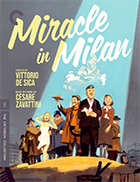Miracle in Milan (Miracolo a Milano)
|  Vittorio De Sica’s Miracle in Milan (Miracolo a Milano) is a seemingly unlikely follow-up to his neorealist masterpiece Bicycle Thieves (Ladri di biciclette, 1948). Like that film, Miracle in Milan is set among the desperate and the poverty-stricken of postwar Italy, but as the title suggests, it veers into the realm of the fantastical, mixing neorealist drama with blissful flights of magical fancy. It is an uneasy mix that doesn’t entirely work, but you can’t fault De Sica for trying something different and unexpected while still maintaining his essential imperative of respecting the dignity of the everyday world through cinematic representation. The film was adapted from the 1942 novel Totò il Buono by Cesare Zavattini, the theoretical father of neorealism who had previously cowritten Bicycle Thieves with De Sica and would go on to write Umberto D. (1952), which is generally considered the last of the classical neorealist films. The protagonist, Totó (Francesco Golisano, who looks a bit like a more baby-faced James Cagney), is discovered as a newborn baby in a cabbage page by a kindly old woman named Lolotta (Emma Gramatica) who raises him into adolescence before dying. At that point he moves to an orphanage, from which he emerges a few years later as a bright-eyed young man with a perpetual smile and good attitude and nowhere to go. He winds up living in a ramshackle homeless community on an empty plot of land on the outskirts of Milan, where he becomes a vital part of the group, offering no end of encouragement and cheer while he works alongside others to make their meager living arrangements as comfortable and enjoyable as possible. De Sica does not skirt the difficulties of life for the down-and-out, regularly reminding us of the tolls that a constant lack of food and shelter can take. Yet, Totó remains blithely positive in all situations, always ready with a smile and a word of encouragement, and the film provides plenty of good humor drawn from the various characters’ desperation. Totó is clearly meant to represent the best that humanity has to offer, which makes him more of a symbol than a person. Golisano, who began his short acting career when he was hired off the street by director Renato Castellani to play one of the lead roles in the neorealist drama Under the Sun of Rome (Sotto il sole di Roma, 1948), does all he can to ground Totó with some kind of human dimension, but he ultimately functions better as an ideal than an actual person. Things take a sharp turn in the film’s second half when it is discovered that the land on which the homeless community has been constructed sits on an enormous well of petrol that starts shooting out of the ground like mini-geysers that the homeless initially mistake for water. This draws the attention of Sr. Mobbi (Guglielmo Barnabò), a wealthy businessman who had earlier respected the homeless community, but now will do anything (including commanding a massive, militaristic police force) to run them off the property so he can exploit it for profit. The underlying Marxist critique of the inhumanity of the capitalist profit motive is clear to the point of being overbearing, but this is balanced to some extent by the amusing visual humor of Sr. Mobbi’s massive, marble-laden office, which none-too-subtly reflects the fascist aesthetic of the previous era. Although the title is singular, there are actually many, many miracles in Milan courtesy of Lolotta’s spirit and a magic white dove she imparts to Totó, which gives him the ability to make anyone’s wish come true. Ever the selfless, kind-hearted hero, Totó offers up his newfound magical abilities to those around him, which results in miracles both significant and petty. In keeping with the film’s neorealist impulse to reflect the realities of human nature, not everyone’s wishes are noble, and many of the homeless jump on the opportunity to enrich themselves or indulge in superficial pleasures. The film’s overarching conflict between the rich and the poor remains largely unaffected, though, as Sr. Mobbi and his minions (which include the police) remain unflappably awful and the poor, although riddled with human flaws, nonetheless maintain our sympathies. It all draws to a fantastical conclusion that is both emotionally stirring and utterly silly, which is pretty much in keeping with the rest of the film.
Copyright © 2022 James Kendrick Thoughts? E-mail James Kendrick All images copyright © The Criterion Collection | |||||||||||||||||||||||||||||
Overall Rating: 

 (2.5)
(2.5)


